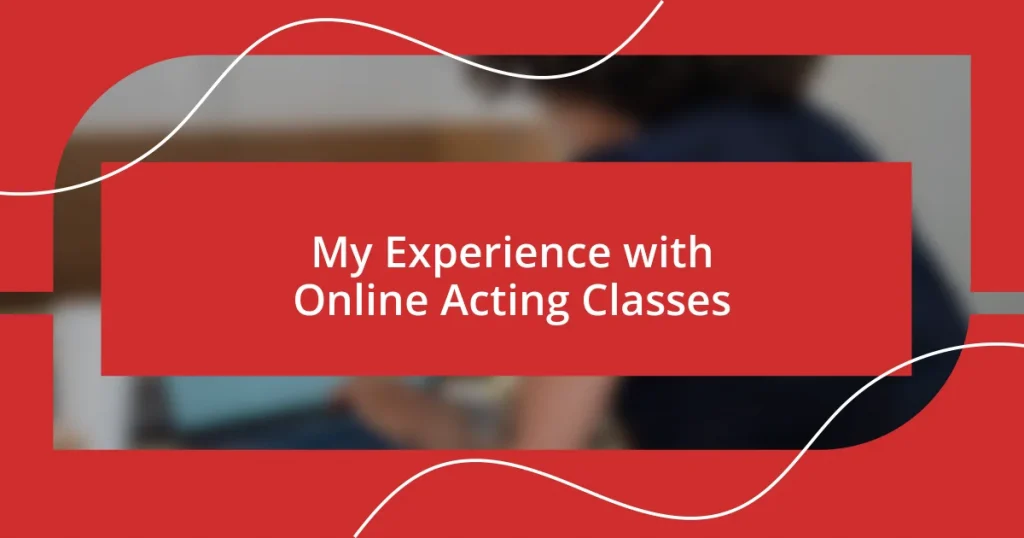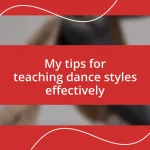Key takeaways:
- Choosing the right online acting class involves evaluating instructors’ backgrounds and reading student reviews to find a supportive community.
- Preparation, including a dedicated workspace, reliable technology, and warm-up exercises, significantly enhances the online learning experience.
- Engaging with instructors and building a supportive network of peers can elevate personal growth and enrich the acting journey.
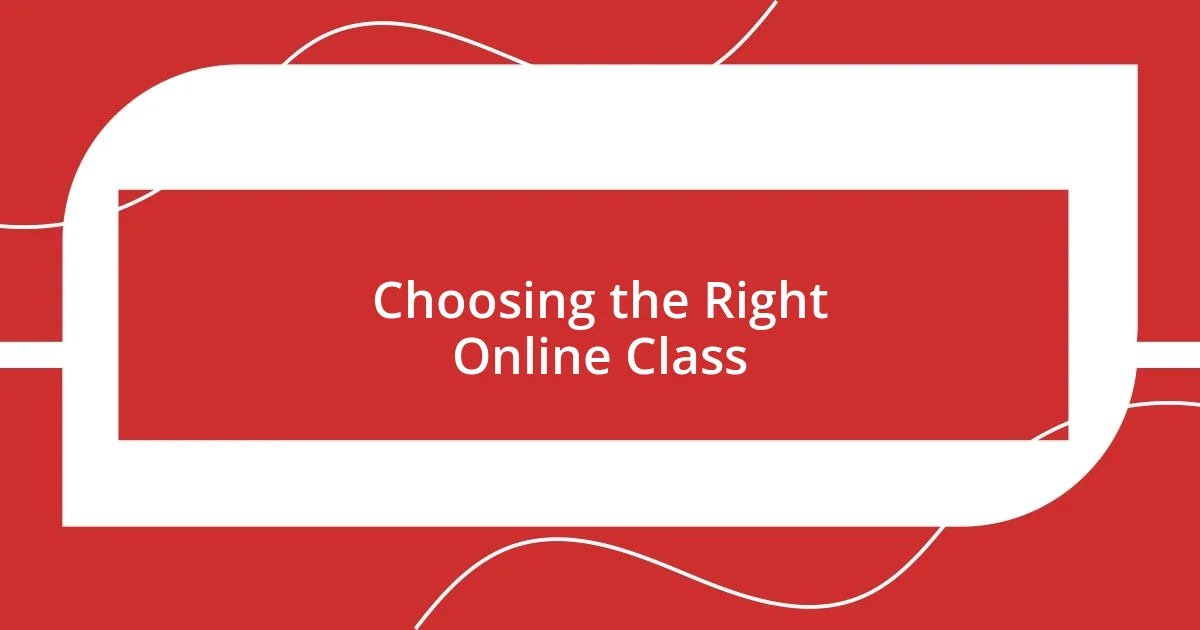
Choosing the Right Online Class
Choosing the right online acting class can feel overwhelming, given the plethora of options available. I remember scrolling through endless course descriptions, trying to decipher which one would best fit my needs. It’s essential to ask yourself: What do I hope to gain from this experience?
When I finally narrowed down my choices, I focused on the instructor’s background. I found that classes led by seasoned professionals who had experience in both acting and teaching offered deeper insights. Have you considered how their approach and style might resonate with you?
Additionally, I learned that reading student reviews can reveal what the class truly offers beyond the flashy marketing. One particularly glowing review spoke volumes about the supportive community formed during the course. That sense of camaraderie turned out to be a vital part of my learning experience, something I never anticipated.
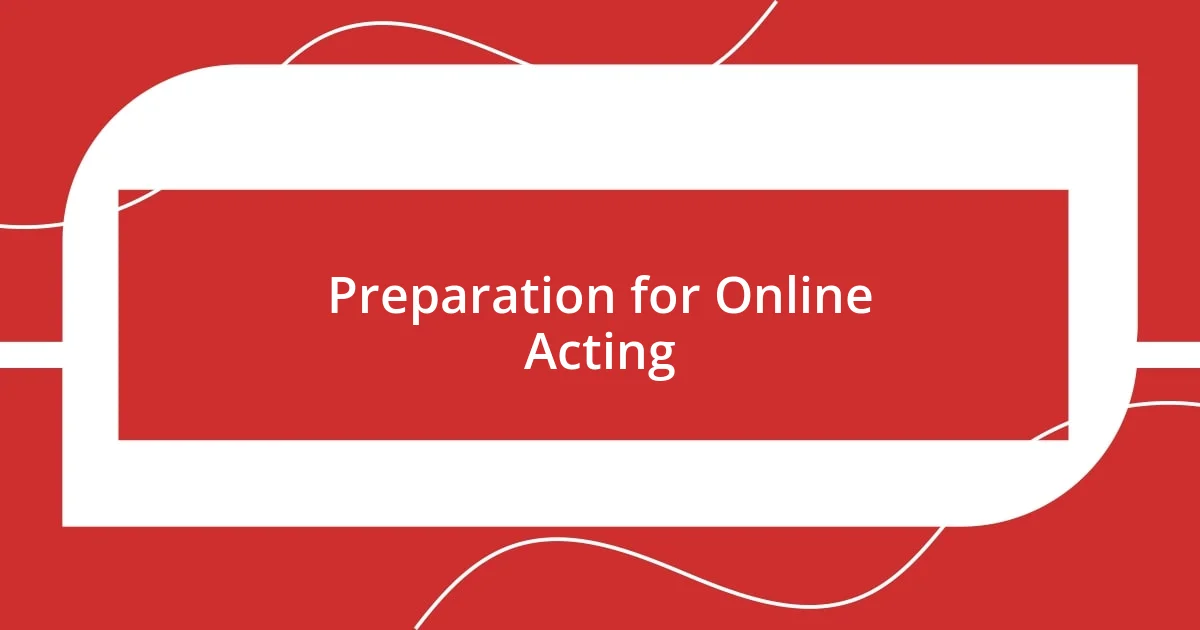
Preparation for Online Acting
Preparing for online acting classes can really enhance your experience. It’s not just about logging on; it’s about creating the right environment. When I first started, I set up a dedicated workspace, complete with good lighting and minimal distractions. Trust me, it made a huge difference when trying to stay focused and engaged during class.
Another crucial aspect is your technology setup. I once learned the hard way that a reliable internet connection is non-negotiable. If your connection is spotty, you risk missing crucial instructions or feedback. I remember a class where my friend faced this issue, and it really impacted their learning. So, I always perform a tech check before class, including testing my camera and microphone to ensure smooth communication.
Finally, I recommend warming up your voice and body before each session. Personally, I found that taking even 10 minutes to stretch and vocalize helped me settle into the right mindset. It’s a time to shake off the day and tune into the character work we’ll be doing. How do you prepare for your acting sessions?
| Preparation Aspect | Details |
|---|---|
| Workspace | Dedicated area with good lighting and minimal distractions |
| Technology | Reliable internet, functional camera and microphone |
| Warm-up | Voice and body exercises to transition into class mode |
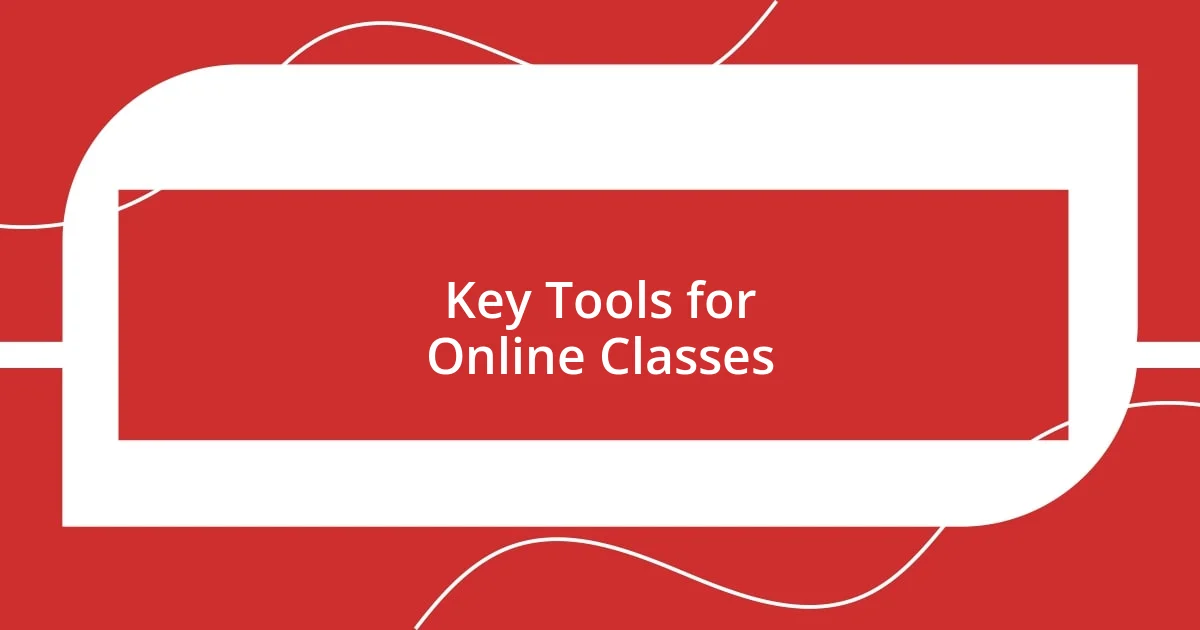
Key Tools for Online Classes
Having the right tools for online acting classes can truly elevate your whole experience. During my journey, I realized that some powerful tools can make all the difference. For instance, I stumbled upon digital platforms that allow for easy script sharing and collaboration. The moment I connected with classmates through shared documents, it felt like we were building a real team, enhancing our performances together.
Here are some key tools that I found invaluable for online acting classes:
- Video Conferencing Software: Platforms like Zoom or Skype for real-time classes and feedback.
- Collaboration Tools: Google Docs for easy access to scripts and notes.
- Digital Acting Resources: Websites offering online monologue libraries to practice.
- Social Media Groups: Facebook or Discord groups for networking and support.
- Recording Software: Apps to record practice sessions and reflect on progress.
Every time I used these tools, I felt more connected to my classmates—like we were all in it together, despite being miles apart. It’s these little things that made my online experience feel much more personal and engaging.
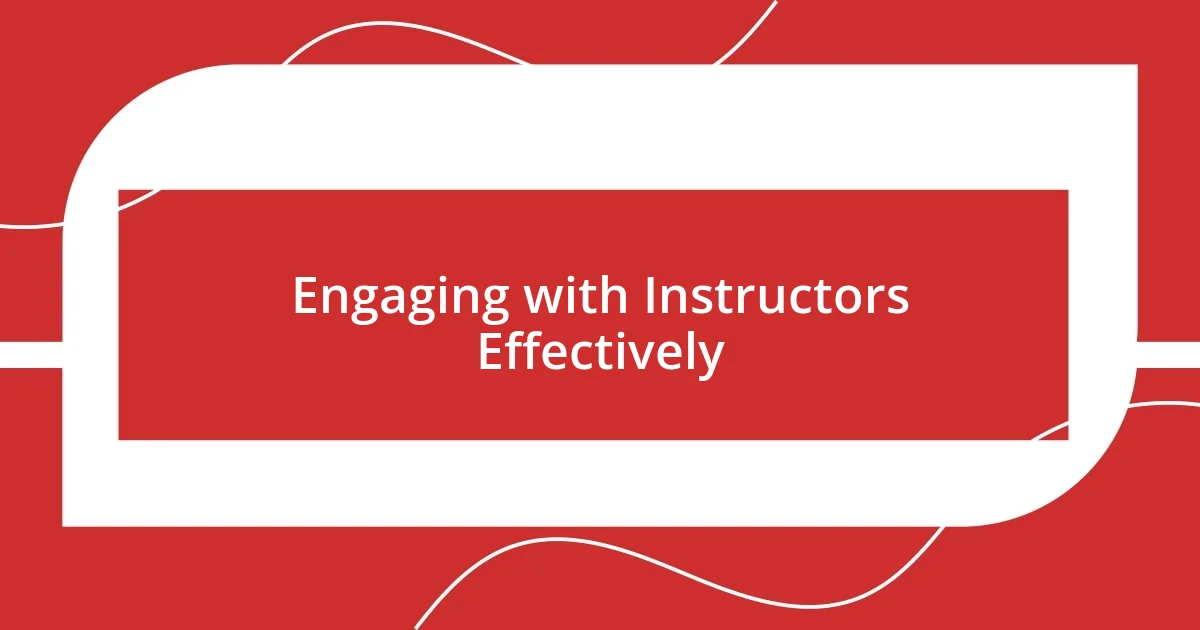
Engaging with Instructors Effectively
Engaging with instructors effectively can transform your online acting experience. I learned this firsthand when I made a conscious effort to interact more during classes. For instance, I remember one session where I boldly asked my instructor to elaborate on a specific technique they mentioned. Their explanation opened up a whole new perspective for me, making me realize how valuable it is to voice my questions and engage in discussions.
It’s also important to show appreciation for feedback. When my instructor pointed out a subtle nuance in my performance, I made a point to thank them for the insight. This simple act of gratitude not only strengthened our rapport but also encouraged them to provide more personalized guidance in future classes. Have you ever considered how expressing appreciation can enhance your learning experience? I found out that it can create a positive feedback loop that benefits both the student and the instructor.
Finally, regular check-ins with your instructor can be incredibly beneficial. I initiated a one-on-one conversation after class with one of my instructors, and that brief moment of connection helped me gain clarity on my goals as an actor. It’s amazing how just extending that olive branch can lead to deeper insights into your craft. Why not take a moment to reach out to your instructor this week? You might be surprised by the meaningful dialogue that can emerge.
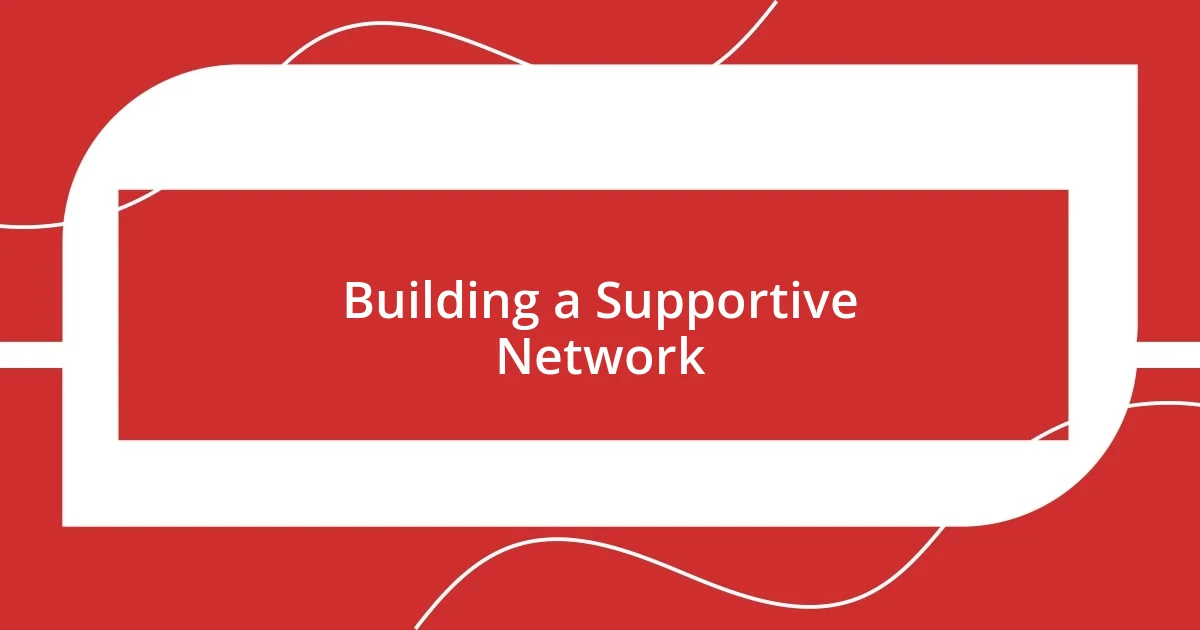
Building a Supportive Network
Building a supportive network in online acting classes can truly elevate your learning and growth. I remember joining a group chat with my classmates after our first few sessions, where we exchanged feedback on performances and offered encouragement. It struck me how uplifting it felt to share a laugh over our shared struggles and successes—like finding a second family in an unexpected place. Have you ever felt that bond when you connect over a passion?
Participating in social media groups also made a significant difference for me. One day, I saw a post from someone looking for scene partners, and we decided to collaborate on a project. This not only expanded my skills but also deepened my network, as we shared resources and insights along the way. The communal spirit that emerges from such connections can be incredibly motivating—don’t you think having peers who understand your journey can help keep your passion ignited?
I learned that attending virtual workshops or seminars can open doors to meeting fellow actors and industry professionals. I had the pleasure of joining a panel with seasoned actors discussing the nuances of character building. Not only did I learn from their experiences, but I also found myself exchanging contact info with a few attendees who shared my interests—an unexpected but delightful outcome. Who knows what opportunities may arise from stepping outside your comfort zone?
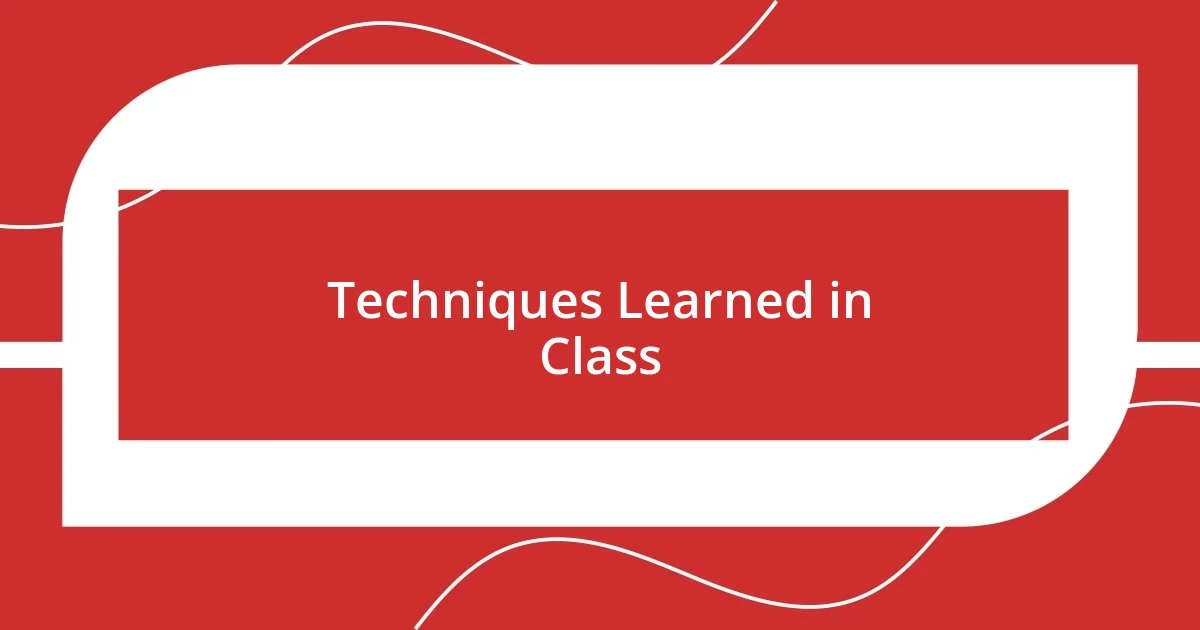
Techniques Learned in Class
One technique I honed during my online acting classes was the use of improvisation exercises. I remember vividly a session where we were thrown into a scene without any preparation. At first, I felt a rush of anxiety, but as I embraced the spontaneity, I discovered how liberating it was to be fully present in the moment. Isn’t it surprising how stepping out of our comfort zones can lead to unexpected breakthroughs?
Another technique that significantly impacted my performance was the practice of emotional recall. During a class, we were tasked to bring forth a personal memory to evoke genuine emotions for our characters. I pulled from a bittersweet childhood memory, and the catharsis I felt was powerful. This exercise not only enhanced my acting depth but also fostered a greater understanding of myself. Have you ever tapped into your own experiences to enrich your creativity?
Lastly, I learned the importance of vocal techniques, particularly breath control and projection. There was a week dedicated to vocal warm-ups, and I found myself returning to those exercises even outside of class. On one memorable occasion, I practiced my lines in the park, and the change in my confidence was palpable; I felt like I was filling the entire space with my voice. Isn’t it amazing how something as simple as breath can transform our presence on stage?
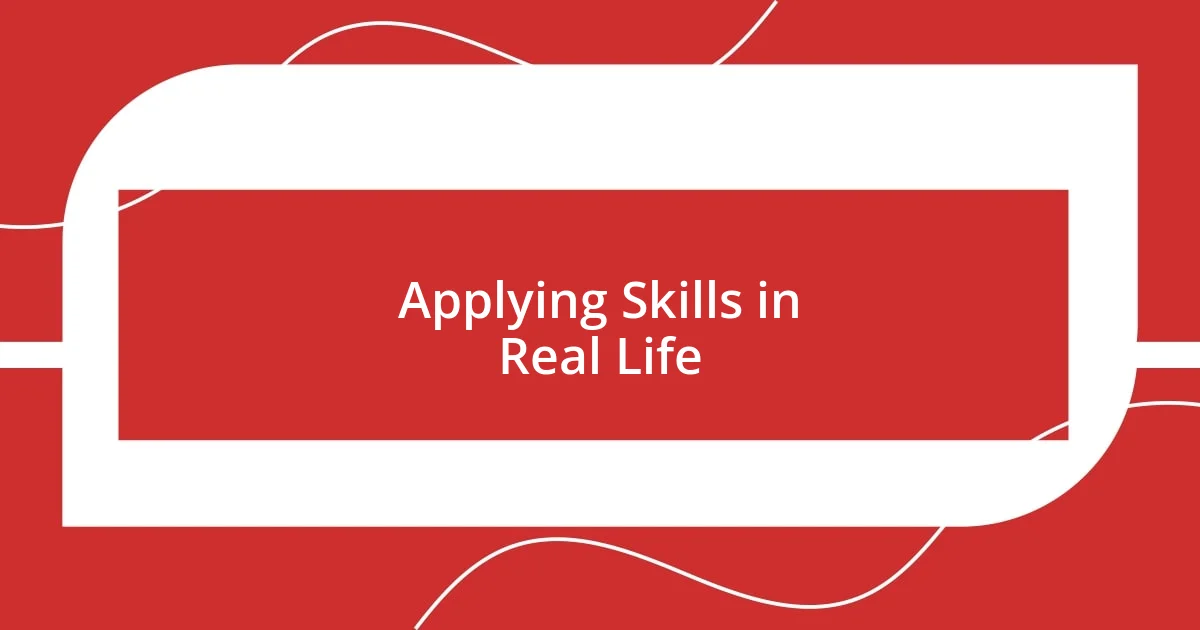
Applying Skills in Real Life
I’ve found that the techniques I learned in online acting classes extend far beyond the virtual stage and into my everyday life. For instance, after practicing emotional recall, I’ve become much more aware of my feelings and how to communicate them. The other day, while sharing a story with friends, I caught myself using the same vivid expressions we practiced in class. It made me wonder, can our art really enhance our genuine connections with others?
Interpersonal skills developed during acting lessons have proven invaluable in various contexts, from casual conversations to job interviews. One time, I was in a meeting where I had to present my ideas to a group of executives. Drawing on what I learned about presence and projection, I took a deep breath and visualized my audience as friends, which helped ease my nerves. Have you ever experienced a moment when you felt completely at ease in a high-pressure situation?
Moreover, the improvisational skills I cultivated during class taught me to think on my feet. I had a spontaneous conversation with a stranger at a café the other day, and I found myself weaving narratives effortlessly. It struck me that embracing spontaneity—not just in acting, but in day-to-day interactions—can lead to meaningful and memorable connections. Isn’t it fascinating how the skills we build in one area of our lives can flourish in another?










